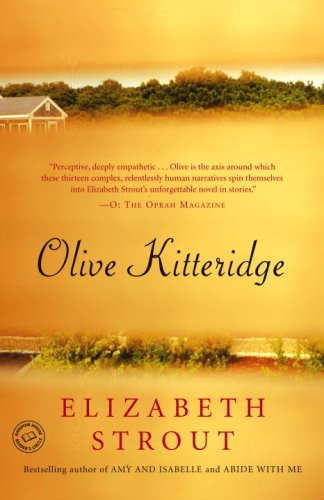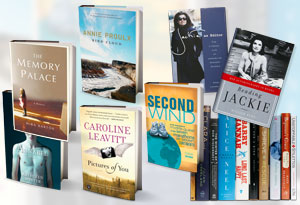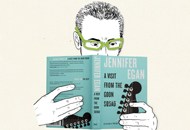Monday, December 27, 2010
The Great Scorer
BY JOHN WOODEN
How poetry shaped a legendary coach's career.
At UCLA, where I was head coach of men’s varsity basketball for twenty-seven years, poetry was one of my favorite teaching tools. I have loved poems since I was a child, perhaps because my father, Joshua Hugh Wooden, introduced me to literature at an early age—reading to his four sons at night under a coal oil lamp in our Indiana farmhouse: Tennyson, Whitman, Longfellow,Whittier, James Whitcomb Riley, Shakespeare, and more.
Later, at Martinsville High School, my basketball coach, Glenn “The ’Ol Fox” Curtis, was a master of motivation and utilized poetry to light a fire in his players. Grantland Rice was one of his primary “assistant coaches” in this area.
During a game against Muncie Central in which our team, the Artesians, were trailing at halftime and were thoroughly dejected, the ’Ol Fox jumped up on a bench as we headed back out to the court. Like a fire-and-brimstone preacher Coach Curtis exhorted us to remember the following:
For when the One Great Scorer
comes to mark against your name,
He writes—not that you won or lost—
but how you played the game.
We lost, but we did not quit. That poem, like many others, worked its magic, and I remembered it when I became a coach.
At UCLA, I constantly incorporated bits of poetry, rhymes, and maxims to help focus attention, give direction, and create inspiration. This seldom occurred during games but was a constant element in the locker room, on bus rides to and from arenas, in hotel lobbies, and especially during practice, where the real work is done, the real improvement made.
Bill Walton, UCLA’s center for two national championships and two undefeated seasons, tells people that I never stopped talking during practice—“an overriding chatter, never silence,” as he describes it. That so-called chatter included instructions on the mechanics of the game, obviously, but also dealt with attitude, which is as important as knowing how to shoot a jump shot properly. Poetry, in all its forms, was an efficient tool for this.
While I never stood on a bench and recited Grantland Rice, I did constantly inject ideas during practice that were “poetic.” If I sensed lagging energy in a player—Bill Walton, perhaps?—I might quickly take him aside and sternly tell him to step it up: “Failing to prepare is preparing to fail, Bill!”
On those occasions when I had to remind him to cut his hair or shave his beard before he could come into practice, he might offer the words of his own favorite poet: “Coach Wooden, ‘The times they are a-changin.’” Well, they weren’t a-changin’ for those who wanted to be members of the UCLA varsity basketball team.
I began each season—the first day of practice—with the same demonstration and instruction: showing players precisely how I wanted them to put on their socks; after that, how to lace and double-tie their shoelaces. “Little things make big things happen,” I cautioned them.
After UCLA won its first national championship in 1964, I quickly reminded players who might be inclined to a sudden swelling of the ego of the following:
Talent is God-given; be humble.
Fame is man-given; be thankful.
Conceit is self-given; be careful.
Is this poetry? Certainly, in my opinion. I have a book of poems on my bookshelf by Billy Collins. The rules of poetry are and should be flexible; good words in good order is good enough for me.
In 1962, UCLA came within a whisker of winning a national championship. A phantom foul called on Walt Hazzard perhaps kept us from the championship game against Ohio State in which we would have been the favorite. Our team had given it everything they had. And been outscored. I reminded them of George Moriarty’s poem:
Who can ask more of a man
than giving all within his span?
Giving all, it seems to me,
is not so far from victory.
A teacher never knows what stays with those he or she is teaching. You do your best using the tools at your disposal. Poetry was one of my many tools. Thus, even though I understood that Bill Walton, Kareem Abdul-Jabbar, and many others on our teams may have raised their eyebrows at some of my maxims and poetry at the time, things changed as they matured. In fact, when Bill had children of his own, he began writing down some of my maxims on their brown paper lunch bags before they left for school.
He tells me their reaction was about the same as his while he played center atUCLA. And says he hopes some of it sticks with them like it did with him.
Poetry works its magic in many different ways.

Sunday, December 19, 2010
Books and Authors

Sunday, December 12, 2010
Carriage House Poetry Series 12th Anniversary

Kinnell, Nye, Padgett & More

A Holiday Gift For Those Who Love Poetry
This classic pocket-sized notebook is both portable and durable. Its built-in accordion pocket is perfect for holding paper mementos and clippings and the stitched binding and elastic clasp will keep your notes safe and close at hand.

Saturday, December 4, 2010
Welcome to the World of Literature!
Olive Kitteridge by Elizabeth Strout

Review:
At first I would have considered Olive Kitteridge a beach read, but it’s just the opposite. Even the cover is misleading. The book, which won a Pulitzer Prize, is not all about Olive but weaves in different stories of people. I read it for my book club and it really generated intense conversations about relationships and love. I hate Olive! She is cruel, speaks her mind, and often is misunderstood. I guess you could say, she is the perfect character. Each chapter tackles a new person in Olive's life, almost making individual stories within the big story. I savored every chapter individually and at times thought of them as stand alone pieces. But, they all seem to meld together in the end.
Biography
Elizabeth Strout is the author of Abide with Me and Amy and Isabelle, which won the Los Angeles Times Art Seidenbaum Award for First Fiction and the Chicago Tribune Heartland Prize. She has also been a finalist for the PEN/Faulkner Award and the Orange Prize in England. Her short stories have been published in a number of magazines, including The New Yorker and O: The Oprah Magazine. She is on the faculty of the MFA program at Queens University in Charlotte, North Carolina, and lives in New York City.
"Funny, wicked and remorseful, Mrs. Kitteridge is a compelling life force, a red-blooded original. When she’s not onstage, we look forward to her return. The book is a page-turner because of her."
"Olive Kitteridge still lingers in memory like a treasured photograph."





